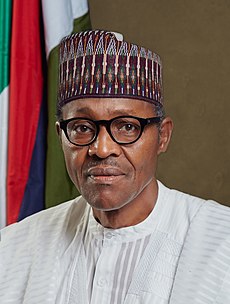
Back Muhammadu Buhari Afrikaans Muhammadu Buhari AMI محمد بخاري Arabic محمد بخارى ARZ Muhammadu Buhari AST Məhəmmədu Buhari Azerbaijani Махамаду Бухары Byelorussian Мухамаду Бухари Bulgarian মুহাম্মাদ বুহারি Bengali/Bangla Muhammadu Buhari Breton
Muhammadu Buhari | |
|---|---|
 Official portrait, 2015 | |
| 7th and 15th President of Nigeria | |
| In office 29 May 2015 – 29 May 2023 | |
| Vice President | Yemi Osinbajo |
| Preceded by | Goodluck Jonathan |
| Succeeded by | Bola Tinubu |
| In office 31 December 1983 – 27 August 1985 as Military Head of State of Nigeria | |
| Chief of Staff | Tunde Idiagbon |
| Preceded by | Shehu Shagari |
| Succeeded by | Ibrahim Babangida |
| Federal Minister of Petroleum Resources | |
| In office 11 November 2015 – 29 May 2023 | |
| President | Himself |
| Minister of State | Emmanuel Ibe Kachikwu Timipre Sylva |
| Preceded by | Diezani Allison-Madueke |
| Succeeded by | Bola Tinubu |
| In office March 1976 – June 1978 as Federal Commissioner of Petroleum and Natural Resources | |
| Head of State | Olusegun Obasanjo |
| Governor of Borno State | |
| In office 3 February 1976 – 15 March 1976 | |
| Head of State | Murtala Mohammed Olusegun Obasanjo |
| Preceded by | Office established |
| Succeeded by | Mustapha Amin |
| In office 1 August 1975 – 3 February 1976 as Governor of the North-Eastern State | |
| Head of State | Murtala Mohammed |
| Preceded by | Musa Usman |
| Succeeded by | Office abolished |
| Personal details | |
| Born | 17 December 1942 Daura, Northern Region, British Nigeria (now in Katsina, Nigeria) |
| Political party | All Progressives Congress (2013–present) |
| Other political affiliations |
|
| Spouses | |
| Relations |
|
| Children | 10
|
| Alma mater | |
| Occupation |
|
| Awards | List of honors and awards |
| Military service | |
| Allegiance | |
| Branch/service | |
| Years of service | 1962–1985 |
| Rank | |
| Battles/wars | Nigerian Civil War Chadian–Nigerian War |
Muhammadu Buhari GCFR (ⓘ; born 17 December 1942) is a Nigerian politician who served as the president of Nigeria from 2015 to 2023.[2][3] A retired Nigerian army major general, he served as the country's military head of state from 31 December 1983 to 27 August 1985, after taking power from the Shehu Shagari civilian government in a military coup d'état.[4][5] The term Buharism is used to describe the authoritarian policies of his military regime.[6][7]
Buhari ran for president of Nigeria on the platform and support of the All Nigeria Peoples Party (ANPP) in 2003 and 2007, and on the Congress for Progressive Change (CPC) platform in 2011.[8] In December 2014, he emerged as the presidential candidate of[9] the All Progressives Congress party for the 2015 general election.[10] Buhari won the election, defeating incumbent President Goodluck Ebele Jonathan.[11] This was the first time in the history of Nigeria that an incumbent president lost a general election. He was sworn in on 29 May 2015. In February 2019, Buhari was re-elected, defeating his closest rival, former Vice President Atiku Abubakar, by over 3 million votes.[12][13][14]
- ^ Paden, John (2016). Muhammadu Buhari: The Challenges of Leadership in Nigeria. Roaring Forties Press. ISBN 978-1-938901-64-5.
- ^ "Muhammadu Buhari | Biography & Facts | Britannica". www.britannica.com. 29 May 2023. Retrieved 3 June 2023.
- ^ "President Buhari's inaugural speech on May 29, 2015". The Guardian Nigeria News - Nigeria and World News. 29 May 2019. Retrieved 22 August 2022.
- ^ "Military Regime of Buhari and Idiagbon, January 1984 – August 1985". Archived from the original on 4 March 2016. Retrieved 12 September 2013.
- ^ Max Siollun (October 2003). "Buhari and Idiagbon: A Missed Opportunity for Nigeria". Dawodu.com. Archived from the original on 6 April 2014. Retrieved 12 September 2013.
- ^ Sanusi Lamido Sanusi (22 July 2002). "Buharism: Economic Theory and Political Economy". Lagos. Archived from the original on 12 March 2015. Retrieved 12 September 2013.
- ^ Mohammed Nura (14 September 2010). "Nigeria: The Spontaneous 'Buharism' Explosion in the Polity". Leadership (Nigeria). Archived from the original on 29 June 2018. Retrieved 12 September 2013.
- ^ "The frustrations of Buhari from 2003 to 2011". Vanguard News. 12 December 2016. Archived from the original on 1 October 2021. Retrieved 1 October 2021.
- ^ "Nigeria election: Muhammadu Buhari wins presidency". BBC News. 1 April 2015. Archived from the original on 10 November 2021. Retrieved 23 September 2021.
- ^ "Buhari in historic election win, emerges Nigeria's President-elect | Premium Times Nigeria". 31 March 2015. Archived from the original on 1 October 2021. Retrieved 1 October 2021.
- ^ "Muhammadu Buhari". The Muslim 500. Retrieved 11 December 2022.
- ^ "UPDATED: Buhari wins second term". Punch Newspapers. 27 February 2019. Archived from the original on 6 September 2019. Retrieved 30 August 2019.
- ^ Stephanie Busari and Aanu Adeoye, for (27 February 2019). "Nigeria's President Muhammadu Buhari reelected, but opponent rejects results". CNN. Archived from the original on 1 October 2021. Retrieved 1 October 2021.
- ^ "Nigeria's Buhari wins re-election, rival pursues fraud claim". Reuters. 27 February 2019. Retrieved 3 June 2023.
© MMXXIII Rich X Search. We shall prevail. All rights reserved. Rich X Search